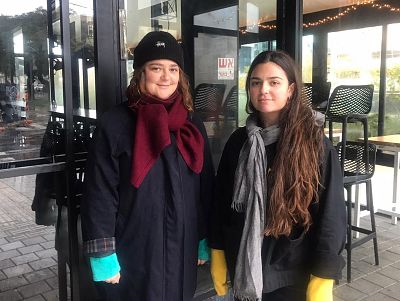Iran has vowed revenge and "harsh retaliation" after Soleimani's killing, leaving some fearing that Israel could face retribution as a close U.S. ally in the region.
TEL AVIV — Prime Minister Benjamin Netanyahu is none too popular in secular and liberal Tel Aviv, but few here find fault in his embrace of President Donald Trump and the U.S. decision to kill Iranian Gen. Qassem Soleimani in Iraq last week.
"Soleimani had it coming," said Rona Tal, who was whiling away a washed-out afternoon in a hip Tel Aviv cafe. "Iran has been provoking Israel and the U.S. for years."
Tal's remarks were echoed across the city, where many Tel Aviv residents welcomedSoleimani's assassination.
Meet The Press
The view was also supported by former defense officials and one-time members of the Israeli security establishment, who described his killing as a significant blow for Iran in its "twilight" war against Israel.
"When a key enemy unit loses its top strategist, policy maker, shadow diplomat and symbolic brand it surely is a huge setback," said Assaf Orion, a former head of strategic planning for the Israeli military's planning directorate.
"President Trump has brought to an end the rule of Abu Bakr al-Baghdadi on the radical Sunni [Islam] side and nowSoleimani from the Shiite terror set, and that's quite an impressive achievement."
Soleimani was the leader of the secretive Quds force, a branch of Iran's Revolutionary Guard, and spent decades overseeing the development of Iran-backed proxies in Lebanon, Syria and the Gaza Strip that now face Israel to the north and south.
In Lebanon, Hezbollah, an armed political group established by Iran in the 1980s, bears down on small Israeli-border communities. In Syria, Israel has confronted the Revolutionary Guard and Iran-backed militias, and in Gaza Iran has long supported Palestinian militant groups, including the enclave's Hamas rulers and particularly the smaller Islamic Jihad group.
Analysis
Israel considers Iran an existential threat.
"It's easier to fight these people without Soleimani," said Ibrahim Srur, 22, who had little to do behind a tourist information desk on a quiet Rothschild Boulevard. "He was one of the most powerful men in Iran and Iran wants to destroy us."
Netanyahu has made Iran a top priority in his decade-long tenure, accusing Tehran of seeking to develop nuclear weapons, comparing it to Nazi Germany and pushing U.S administrations not to sign — and later to withdraw from — the country's 2015 nuclear deal with world powers.
He has also been an advocate for direct military action against Iran andat times reined in by top generals.
"I want to clarify again — Israel is completely on the side of the U.S. in its struggle for security, peace and self-defense," Netanyahu said Sunday as the Israeli workweek began.
But on the streets of Tel Aviv some were concerned that Israel, as a U.S. ally in the region, might now itself be vulnerable to attack.
An Iranian general warned Saturday that some 35 U.S. targets in the region as well as Tel Aviv were "within the reach of the Islamic Republic,"Iran's Tasnim news agency reported.
Iran has vowed revenge and "harsh retaliation" to avenge Soleimani's killing. On Sunday Iran saidit would pull out entirelyfrom the 2015 nuclear deal that constrained its nuclear ambitions.
Tens of thousands of mourners thronged around Soleimani's coffin as his body arrived in Iran Sunday ahead of a grand funeral procession across the Islamic Republic. And on the streets of Baghdad on Saturday mourners chanted, "Death to America, death to Israel."
World
"It makes us more vulnerable because we are an easier target than America due to the geography," said Danielle Mimram, 29, who recently moved to Israel from England but has been back and forth to the region her whole life.
Yet Mimram added that she felt relatively safe in the "bubble" that is Tel Aviv, farther away from Israel's frontlines in the south and north.
It was a view repeated by other Tel Aviv residents, many of whom stressed that Israel is used to living in a state of high tension.
As to whether it would be hit by a retaliatory attack, most agreed that it was possible but dismissed any notion that it would escalate into full-blown conflict.
If Iran did target Israel, they said, it would likely be just another flare-up in the long-shadow war between the two countries that ensued in the wake of Iran's 1979 revolution.
Israel and Iran have not always been at odds.
During the rule of Shah Mohammed Reza Pahlavi, the two countries had close ties including diplomatic representation and flight routes. But the revolution ousting the shah ended that. The revolution's leader, Ayatollah Khomeini, declared Israel an "enemy of Islam" and cut all ties.
Several of those on Tel Aviv's streets emphasized the strength of the Israeli army and believed it would act as a deterrence when Iran considered whom to hit and how hard. But for some, direct conflict with Iran would have more tangible consequences.
"The situation may get heated and I'm a reserve for the army — it would worry me if the reserves were called up," said Moran Laviv, 22, taking time out from his job behind a smoothie bar.
His colleague, Omer Caspi, 18, said he could also be on the frontlines of any conflict between Israel and Iran, should one escalate, as he was due in three months to join the navy. But he dismissed any cause for concern.
"In Israel I feel safe," he said. "Israel doesn't want a war."
Analysis
Netanyahu cut short an official visit to Greece following Soleimani's killing Friday, telling reporters that Israel stood with the U.S., which had every "right to self-defense."
The Israeli military said Friday that in light of the situation it was closing a ski resort in the Israeli-occupied Golan Heights, near the border with Syria.
Netanyahu's ministers kept a low profile over the Sabbath, which former defense officials suggested was a wise move.
Soleimani's assassination comes at a politically sensitive time for Israel as it heads reluctantly to a third election within a year. The two recent national votes have resulted in political deadlock with no leader able to form a majority in the Israeli Parliament, known as the Knesset.
At the same time, Netanyahu finds his future as leader more uncertain than ever after he was indicted in November on charges of fraud, bribery and breach of trust. On Wednesday, Netanyahu asked for immunity from the Knesset.
Martine Tsabary, a former kindergarten teacher who was having coffee at a central Tel Aviv mall with a friend, said she thought Netanyahu was out for political survival and was flogging his strongest card — that he was "Mr. Security."
"Israel needs peace but almost everything he does makes things worse with our neighbors," said Tsabary, adding that she wished Netanyahu would stay quiet.
But the prime minister was not alone in praising the death of Soleimani.
His top political opponent, Benny Gantz, was also quick to commend Trump, describing his decision as the "appropriate response to anyone responsible for the murder of countless innocent people and for undermining global stability."
Not all lawmakers, however, sang from the same hymn sheet.
"Those who pop open champagne today do not not understand that killing Soleimani can lead to an attack against Israel,"said Ofer Cassif, a member of the Arab Joint List, a bloc of four small Arab parties. The Joint List came third in September's election, with 13 seats, after Gantz's Blue and White party and Netanyahu's right-wing Likud.
"If American bullying leads to loss of Israeli life, it will be on the hands of Trump and his fellow offender Netanyahu," Cassif said.















